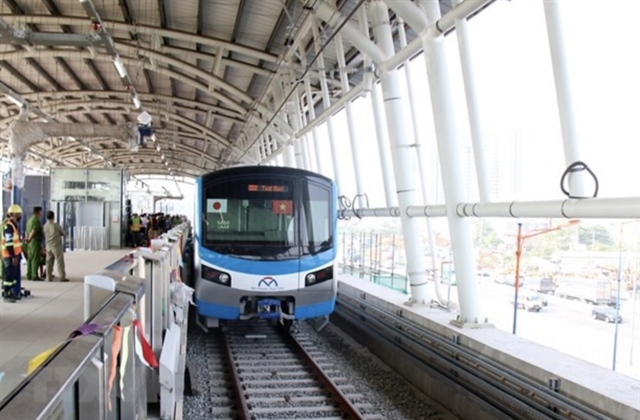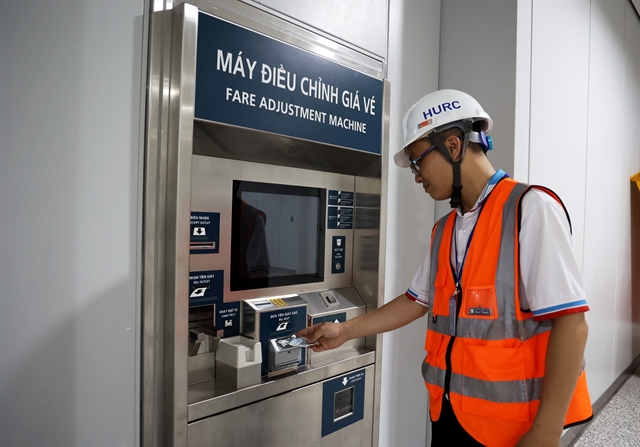 Society
Society

 |
| A fare adjustment machine installed at Bến thành Underground Station of HCM City’s Metro Line No 1. — VNS Photo Hồng Đạt |
HCM CITY — HCM City’s Metro Line 1, which is set to officially open on December 22, will offer convenient and efficient public transportation with various ticket options and payment methods, including contactless payments and integrated ticketing systems.
According to Lê Minh Triết, director of the HCM City Urban Railway Company No. 1 (HURC1), the automated fare collection (AFC) system at metro stations is fully prepared to serve passengers.
HURC1 will issue about 600,000 train tickets for the initial commercial operation phase.
The company will transparently publish ticket pricing at metro stations, through media channels and on their website to facilitate passenger ease and expedite ticket purchases.
In addition, detailed information regarding schedules, ticket prices, and station details will be updated on websites and mobile applications, enabling citizens to conveniently plan their movements and ensure timely travel.
Passengers can register for tickets directly at stations along the line.
Ticket fares, including passenger body insurance, fluctuate between VNĐ6,000-20,000 (US$0.3-0.8) per journey, contingent upon payment method and travel distance.
Day passes VNĐ40,000 ($1.6) offer unlimited daily travel.
Three-day tickets VNĐ90,000 ($3.5) provide unrestricted trips within that period.
Monthly passes for standard passengers VNĐ300,000 ($11.8) have unlimited monthly travel.
Student monthly tickets are priced at VNĐ150,000 ($5.9).
Metro passengers must traverse ticket control gates featuring two small barriers, positioned at the gate’s entrance and exit, after scanning their ticket.
The gate opens upon ticket validation. Following successful scanning, passengers board the train and subsequently verify their tickets.
Passengers must retain their ticket throughout the journey for exit gate scanning upon trip completion.
Absent any complications, the entire process from ticket purchase to train boarding consumes merely from two to three minutes.
The line features fare adjustment machines for passengers exceeding their originally purchased route segment.
For instance, if a passenger purchases a ticket from Bến Thành Station to Ba Son Station but continues to Suối Tiên Station, they can utilise the automated ticket machine at Suối Tiên station to supplement the price differential, ensuring sufficient coverage for the entire travel route.
Ticket and fare adjustment machines are strategically positioned at stations, easily visible and conveniently accessible to passengers.
These machines offer multi-functional capabilities, including display screens, cash and coin receptacles, keyboards, and receipt printers.
Comprehensive step-by-step guidance for ticket purchases, returns, and monetary loading is provided.
Screen interfaces facilitate destination selection and display the corresponding travel cost.
Additional functionalities include ticket information verification, deposit refunds, change provision, and AFC card monetary loading.
The AFC system at metro stations comprises ticket vending machines (TVM), fare adjustment machines (FAM), ticket gates (PG), station staff terminals (SST), station servers (SS), a central server (CS), and network equipment, card issuance and recycling devices, cash management equipment, and contactless smart IC cards.
The AFC system provides around five million contactless IC cards for train travel, including three basic types of single-journey tickets, day passes (covering one and three days), and rechargeable cards.
The ticket machines additionally accommodate discounted tickets for priority passengers, monthly passes, while supporting various payment methods, including EMV banking systems from domestic and international payment networks like Napas, Mastercard, Visa and JCB, and e-wallets such as VNPay and MoMo.
“During initial operations, the first month will be complimentary, so immediate pre-sale ticket implementation is not yet planned,” Triết said.
 |
| A section of HCM City’s Metro Line No 1 between District 1's Bến Thành Market and Thủ Đức City's Long Thành Depot. — VNS Photo Nguyễn Diệp |
In response to the inquiry about when passengers can use a single card for buses, metro, and bicycles, Ngô Hải Đường, head of the Road Transport Management Division at the city’s Transport Department, said the department would propose to the municipal People’s Committee to issue fares for intermodal transportation, facilitating convenient use of public transport in the city.
This system would allow passengers to switch between public transport modes with just one ticket, saving both time and money, he said.
For the implementation of integrated ticketing for various public transport modes, the city Management Centre for Public Transport (MCPT) is installing equipment and conducting technical tests to put the system into operation in the first quarter of 2025.
Meanwhile, cashless payments will soon be implemented across the entire bus system.
MCPT is deploying cashless payment systems on buses and expects to introduce them for widespread use in the first quarter of 2025.
Residents will be able to use banking apps on their phones to pay for bus fares.
Many economic experts said the city should complete the integration of a single payment card for all public transport as soon as possible.
Applying cards that allow inter-operability with all public transport service providers, including buses and metro, would facilitate and encourage citizens to use this transport mode more often, laying the foundation for reorganising urban transportation, they said.
HCM City’s Metro Line 1 spans 19.7km between District 1's Bến Thành Market and Thủ Đức City's Long Thành Depot, featuring three underground stations and 11 elevated stops.
Its construction began in 2012 and has experienced various delays, with costs rising to VNĐ43.7 trillion ($1.7 billion). — VNS




